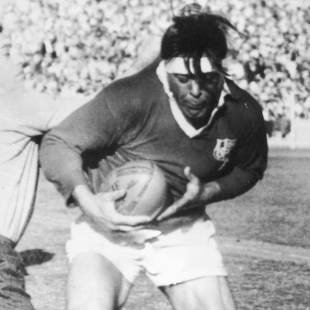|
Australia 0 - 31 British Lions, Brisbane
The Lions maul the sorry Wallabies
Richard Seeckts
June 4, 1966

Michael Campbell-Lamerton takes the game to Australia
© Getty Images Enlarge
The Lions trounced Australia with five second half tries to win the series 2-0 and set off for New Zealand, where a sterner challenge awaited. This match still holds the records for the Lions' biggest Test win, highest points score and most tries. 1960's Australia was not a world force in rugby union, the game being played only in Queensland and New South Wales, with the best players quickly being snapped up by professional rugby league. The Lions' visit en route to New Zealand served two purposes; to raise the profile of the game in Australia and as a warm-up for facing the All Blacks. Lions selection and management was still bedevilled by old-fashioned thinking and the amateur ethos that was cruelly exposed on the main leg of the tour. In Australia, however, the tourists' dominance gave rise to a false sense of security. Mike Campbell-Lamerton, former Scotland captain, army officer and all-round good egg was a surprise choice as captain alongside the affable management duo of Des O'Brien and John Robins, both eminent internationals in the post-war era, but out of touch with the game of 1966. The first Test in Sydney had gone the Lions' way 11-8 and hopes were high that, if Australia's pack could be tamed again, a good supply of possession to the Lions' superior backs would see them through. Australia's legendary half-back partnership, Ken Catchpole and Phil Hawthorne, had only youth and lack of experience behind them. Full-back Stewart Wilson kicked a long-range penalty for the Lions in the opening minute but there were no more scores in the first half. Alun Pask was the pick of a rampaging pack but handling errors by both sides meant missed scoring opportunities. Immediately after half-time, fly half David Watkins kicked a drop goal and, though the Lions clearly had the game in hand, it was to be nearly 20 minutes before the scoring spree unfolded. An hour of forward domination eventually took its toll on the hosts. The Times reported, "They picked up their robust opponents by the scruff of the neck, shook them till their teeth rattled, then flung them away as though tired of them." The forward effort provided a "springboard to lively, eager backs who romped joyously and artistically." Watkins was described as "twinkle-toed and scintillating", Ken Jones as "one of the most dangerous attacking players" and Mike Weston as "consistently underrated....one who does good by stealth and blushes to find its fame". Both wings played their part and Wilson kicked 13 points in a true 15 man display. "Some of the Lions' play in the second half was such pure poetry that it made the first half look like some jingling doggerel."

David Watkins guided the Lions to victory
© PA Photos
Enlarge
The storm of tries began when Weston sent Jones in under the posts. A change of direction by Weston immediately afterwards enabled Jones to give David Watkins a scoring pass, and it was Weston again who initiated the move that ended with Dewi Bebb touching down for the third. The final two tries came from cross-field kicks taken perfectly by Noel Murphy and Jones respectively. John Thornett and his Wallaby team "struggled bravely but could not live with it, and long before no-side they had been systematically chopped to pieces," said The Times, continuing, "They recalled what so often happens to Irish teams, putting everything into an explosive start, then blowing up." In doing so they allowed the Lions to give "one of the most marvellous exhibitions of attacking rugby football that most people could remember for many years and, although Australia fell to pieces in the last quarter of the match, few teams on earth could have stood up to the sort of game the Lions played, once they had pulled out all the stops". The one team on earth that could stand up to the Lions, New Zealand, did so with devastating effect in the weeks that followed. Campbell-Lamerton dropped himself from two Tests as the series was lost 4-0. Foul play was high on the All Black menu and some Lions were not up to the physical confrontation. It was the fall-out from this tour that shaped the thinking of Willie-John McBride in preparation for the Lions most successful period, the early 1970s. © ESPN Sports Media Ltd.
| |||||||||||||||
Live Sports
Communication error please reload the page.
-
Football
-
Cricket
-
Rugby
-
- Days
- Hrs
- Mins
- Secs
F1 - Abu Dhabi GP
Abu Dhabi Grand Prix December 11-131. Max Verstappen ()
2. Valtteri Bottas (Mercedes)
3. Lewis Hamilton (Mercedes)
4. Alexander Albon ()
5. Lando Norris ()
6. Carlos Sainz Jr ()
-
ESPNOtherLive >>
Golf - Houston Open
Snooker - China Open
Tennis - Miami Open

